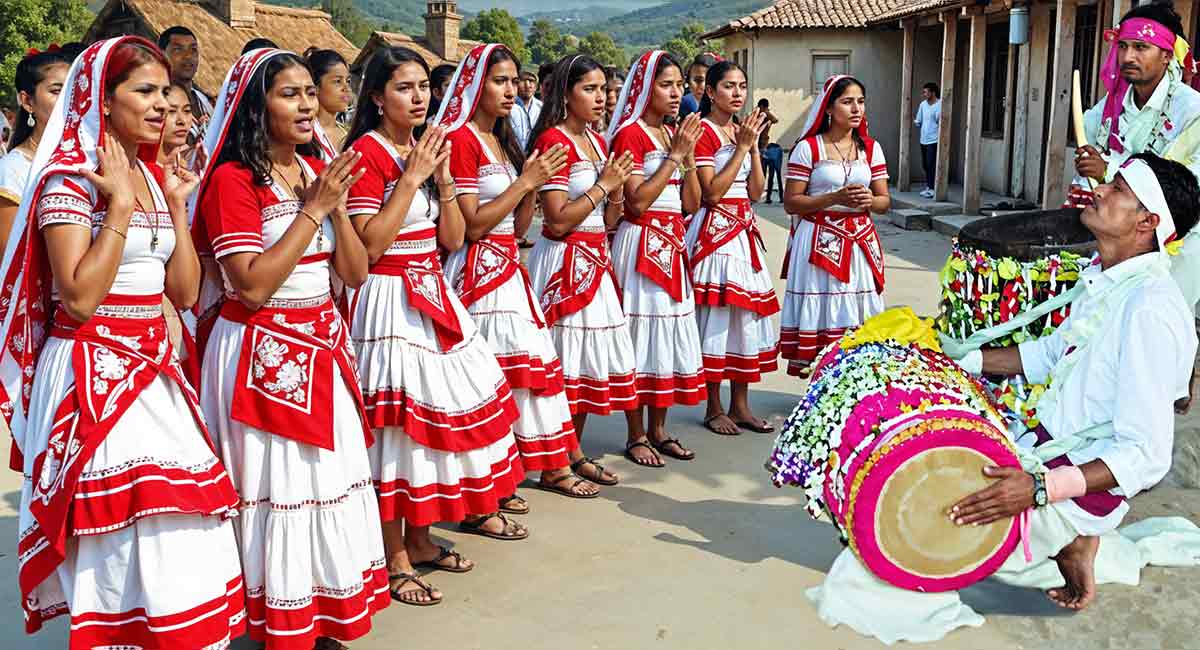Kedu Festival of Odisha’s Kondh Tribe
Odisha, a state known for its rich cultural diversity, ancient traditions, and vibrant festivals, is home to many indigenous communities that still uphold their unique customs and rituals. One such intriguing and little-known ritual is the Kedu Festival, celebrated by the Kondh Tribe, one of the most significant indigenous communities of Odisha. This festival, rooted in age-old traditions, involves a unique buffalo sacrifice that holds both spiritual significance and reflects the tribe’s complex relationship with its environment.
Understanding the Kondh Tribe
The Kondh people, also known as the Konds or Khonds, primarily reside in the hilly regions of Odisha and Andhra Pradesh. The tribe is known for its distinct cultural identity, rich folklore, and vibrant festivals. They have maintained their ancestral customs and traditions despite the impact of modernity. Their livelihood is based primarily on agriculture, and they have strong religious ties to nature, especially the forest and its inhabitants.
For the Kondh people, the land and its natural resources are not mere commodities but sacred gifts from the divine. They connect their deities to various aspects of nature, including animals, plants, and the elements. The Kedu Festival is one such ritual that highlights the tribe’s respect for nature and their belief in the spiritual significance of sacrifice.
The Significance of the Kedu Festival
The Kedu Festival, celebrated annually, is a profoundly spiritual occasion for the Kondh people. The primary focus of the festival is the buffalo sacrifice, which is performed as an offering to the village deity, typically the earth goddess or a local spirit, in exchange for a bountiful harvest and protection for the community. In addition to paying respect to the spirits, the tribe thanks them for their protection and the blessings they bring.
When the Kondh tribe has finished planting and is anticipating a bountiful crop, the festival usually occurs during the harvest season. The tribe believes that sacrificing a buffalo ensures the gods’ favor and brings prosperity to their agricultural endeavors. The ceremony is also seen as a means of preserving equilibrium between the spiritual and human realms, ensuring the tribe’s wealth and well-being.
Rituals of the Kedu Festival
The Kedu Festival is a multi-day event, filled with elaborate rituals, music, dance, and communal gatherings. The central event, however, is the buffalo sacrifice, which holds immense religious and cultural significance.
- Preparation of the Buffalo: The buffalo chosen for sacrifice is often the strongest and healthiest of the herd. The Kondh people believe that the animal’s life force will be transferred to the community, bringing strength and prosperity. They carefully groom and feed the buffalo with exceptional food in the days leading up to the ritual to ensure its prime condition.
- Offerings and Prayers: The ritual begins with prayers and offerings to the village deity. Tribal priests, known as “Pujaris,” lead the ceremonial prayers. They offer fruits, flowers, and other sacred items, invoking the blessings of the gods. The entire community participates in this spiritual act, with everyone gathered around the sacrificial site.
- The Sacrifice: At the heart of the festival is the buffalo sacrifice. They lead the animal to a sacred spot in the village, often near the temple or in a specially designated open area. The priests perform an elaborate chant and use ceremonial tools to sacrifice the buffalo. People perform the sacrifice in a specific manner, following traditional guidelines passed down through generations.
- Post-sacrifice Rituals: After the sacrifice, the meat is divided among the community. Every member of the tribe, from the elders to the children, receives a portion of the food. This distribution of meat symbolizes the sharing of the animal’s strength and life force. The entire tribe comes together for a lavish feast at the end of the celebration to commemorate the ritual’s successful completion and the blessings they think it bestows.
- Music and Dance: No festival in Odisha is complete without music and dance, and the Kedu Festival is no exception. Kondh dancers perform traditional dances throughout the event, accompanied by drums and other instruments. The dances symbolize unity, gratitude to the gods, and the tribe’s triumph over adversity.
The Controversy of Animal Sacrifice
While the Kedu Festival remains an integral part of the Kondh tribe’s cultural fabric, it has not been without its controversies. The buffalo sacrifice, in particular, has drawn the attention of animal rights activists and conservationists, who argue against the ritual on ethical grounds. Critics have condemned the practice for its violence against animals and its conflict with modern views on animal rights.
In response, the Kondh community has defended the ritual as an essential part of their cultural and spiritual identity. Supporters argue that the community respectfully performs the sacrifice, giving the buffalo’s life in exchange for prosperity and protection. They also stress that they think the animal is essential to preserving the harmony of the natural environment and treat it with the utmost respect throughout its life.
Final Thoughts
The Kondh community of Odisha’s Kedu Festival offers an intriguing look into the religious and cultural customs of one of India’s indigenous groups. The buffalo sacrifice, while controversial, is a vital part of the community’s relationship with nature and their beliefs in the interconnectedness of all life. As modernity and animal rights concerns continue to shape the cultural landscape, the Kedu Festival will undoubtedly face challenges. Still, it remains a powerful testament to the resilience and richness of the Kondh community’s heritage. Through continued dialogue and adaptation, the Kedu Festival may evolve, but its core message of gratitude, respect for nature, and community unity will remain at its heart.


